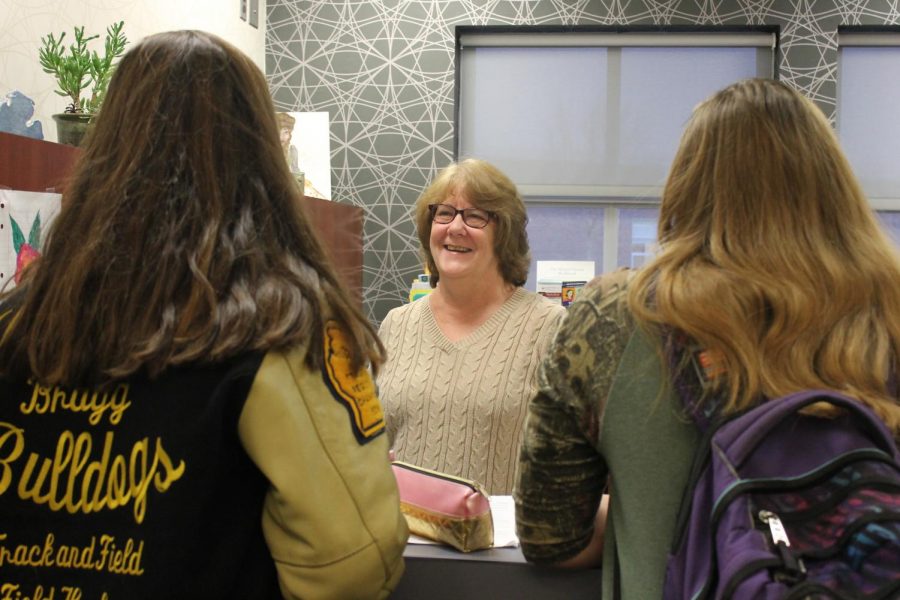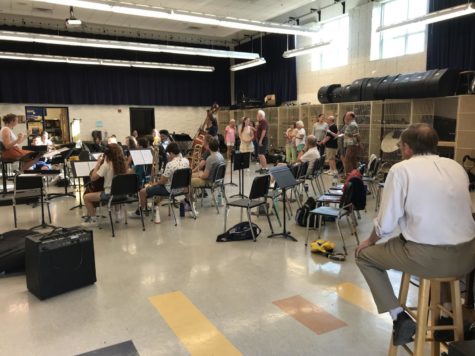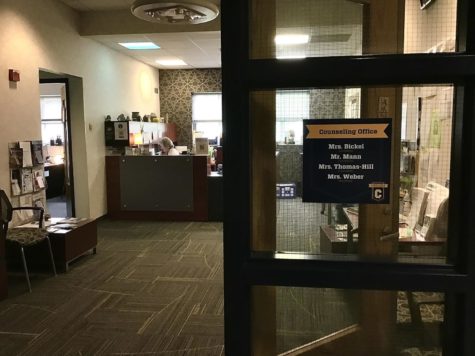Staff Spotlight – Weber’s Wisdom: Lessons from an “Old Farm Girl”
Just above the lunchroom in the Chelsea High School building is a row of counseling offices, and at the foot of these is a small waiting room and a brightly decorated desk where Ms. Weber, the school counseling secretary self-described as “an old farm girl”, greets students, school staff and parents alike with a smile. “Whether it’s with homework in the media center or college applications up in the office, I love to help people,” she said.
Ms. Weber first came to high school way back in 1994, working in the media center for 20 years before moving up to the counseling office in 2014. Above everything else about her job, Ms. Weber loves the aspect of being able to serve others, whether students or staff. When asked what was the inspiration for her kindness, she promptly identified her mother, saying, “I always wanted not to be like her, but to be as good as her… I don’t mean good as far as achievement, but good as far as being a good person.” As a child, Ms. Weber remembers the profound example of loyalty her mother set for her by serving others without seeking recognition and showing respect to all regardless of her circumstances or theirs. “That influences me a lot,” she admitted, “because we’re always going through things. I try to realize that it’s not about me; it’s about what other people are going through.”
Along with the example set by her mother, Ms. Weber credits many of her life’s lessons to her childhood experiences on the farm, where she raised pigs, cows, chickens. “It was a great life growing up because I learned responsibility and self sufficiency–and work ethic.” Ms. Weber recounts selling vegetables from her one-and-a-half acre garden plot in the summer to buy school clothes and even selling tomatoes door-to-door when she was very young, but one of the more influential lessons in her life came from her experience with farm animals. “When you’re taking care of animals, you learn compassion when they’re ill and you go through grief for them when they pass,” she explained. Looking back at her childhood, Ms. Weber said “The farm was a big part of what I am now.”
After leaving her childhood farm, Ms. Weber settled in Grass Lake with her husband. Although she now lives apart from the holistic farm environment of her youth, she still recognizes the importance of connecting with nature now and again. Up in northern Michigan, she and her husband own 40 acres of woods and a cabin with no electricity. This place is what Ms. Weber describes as her “Sanity,” a place where there is only peace. When she is at home, Ms. Weber likes to “just sit outside and watch nature.” She especially loves watching the wildlife in her yard, admitting, “You learn a lot just by watching birds.”
As technology advances and the digital age continues to value social media over simple, face-to-face interaction, Ms. Weber worries that the rising generation will not know the lessons and experiences that have changed her life so much. When asked about how she saw the world today, she expressed her view in this statement: “I don’t think socially we have caught up with our tools, and that is a bit worrisome to me. It’s not that I don’t like technology, I just think that we are not teaching ourselves to be mature about it.” Although the values of kindness, loyalty, and connection with nature that Ms. Weber so cherishes seem to be completely disappearing from today’s world, Ms. Weber has hope for the rising generation. “I think [change] is going to start with younger generations seeing the value of, kindness, working together, and coming together in a positive way.” She hopes that older people, like herself, can be effective in teaching them the importance of simple, sincere interaction and of physical, rather than virtual, connection with the world; however, she realizes that newer technologies may be key in introducing this change, and she foresees “a battle of technology,” in which younger people use the new tools of the internet and social media to change the world for the better.
In a society that Ms. Weber describes as “a world that’s searching for answers,” perhaps we can make a change by looking at things from the old-fashioned view as well as our usual perspective. Perhaps we can stem the tide of negativity, disconnectedness, and the myths of ‘perfect lives’ propped up by social media if we just look to our elders for advice, for this is how we keep ourselves from repeating history. In short, I think we all need a lesson from an “old farm girl.”





